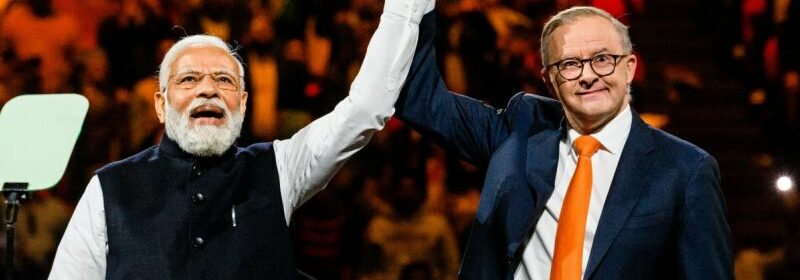‘It’s in our DNA’: Australia vows not to ignore human rights as it finalises India trade deal

Save articles for later
Add articles to your saved list and come back to them any time.
Washington: Australia will not shy away from addressing India’s human rights record even as it seeks to finalise a trade deal with the Modi government by the end of the year, says Trade Minister Don Farrell.
One week after Indian Prime Minister Narendra Modi visited Sydney for bilateral talks with Anthony Albanese, the federal government has moved to accelerate the conclusion of a long-awaited comprehensive economic co-operation agreement, which would improve tariffs, open up new markets between the two countries and bring Australia closer to a key Indo-Pacific partner.
Indian Prime Minister Narendra Modi on stage with Anthony Albanese in Sydney last week.Credit: James Brickwood
Negotiations for the agreement were launched in 2011, suspended in 2016, and then revived again in 2021. However, speaking as he concluded a trip to the US, Farrell said told this masthead he would like to see a deal inked “by the end of the year”.
Asked how the government would approach its complex alliance with India – which has come under scrutiny over the persecution of ethnic minorities, its neutrality over Russia’s war in Ukraine, and its imprisonment of human rights activists – he replied: “We never step away from our support for human rights – that’s in our DNA.”
“If there are issues, we will raise them. That doesn’t mean we can’t have another conversation about trade diversification. I think we can do both of those things.”
The comments came after the minister visited Detroit to attend Asia-Pacific Economic Cooperation (APEC) and the Indo-Pacific Economic Framework (IPEF) meetings. While there, he also took part in talks with US Secretary of Commerce Gina Raimondo after the historic agreement between President Joe Biden and Albanese to boost co-operation under a new “Climate, Critical Minerals, and Clean Energy Transformation Compact”.
The compact was touted by the government as a win for Australia, which supplies around half of the world’s lithium, as well as other minerals like rare earths used in batteries for electric cars and defence.
Farrell declared that Australia was now on track for a “golden age” of critical mineral exploration, underpinned by Biden’s signature climate change policy, the Inflation Reduction Act.
The policy commits $US400 billion ($613 billion) in incentives and tax credits on clean technologies from electric vehicles to hydrogen manufacturing. Credits on EVs are only granted if a large portion of the minerals they use are extracted or processed either in the US or a country with a US free-trade agreement, such as Australia.
“Australia is in the fortunate position of having the most or second-most reserves of all the critical minerals that the United States is going to need to make that transition to the decarbonised economy,” Farrell said.
“Americans are looking to us to supply that. They’re also looking to invest in Australia. So I’m actually extremely optimistic for the future for critical minerals in Australia … I think the demand will be such that there’s going to be a golden age of critical minerals in Australia.”
Farrell also met with Chinese Commerce Minister Wang Wentao in Detroit on Friday. The talks came after he visited his counterpart in Beijing for the first in-person meeting between the two nation’s trade ministers since 2019 – soon after which, the Chinese government removed its economic sanctions on Australian timber.
He said while the pair had made some progress, “we obviously want the removal of further impediments like [on] barley, hay, wine, lobsters, some meat.
Trade and Tourism Minister Don Farrell.Credit: Alex Ellinghausen
“We haven’t resolved every issue but it’s our intention to get to a point where our relationship is stabilised, and we resolve all of the outstanding impediments.”
Get a note directly from our foreign correspondents on what’s making headlines around the world. Sign up for the weekly What in the World newsletter here.
Most Viewed in World
From our partners
Source: Read Full Article

